
|
"Reduction, Emergence, and Essence"
2009 Summer Seminar Plan and Schedule
The Summer Seminar ran from Monday
afternoon, June 15th, through Friday afternoon, June 19th in
1-273. The readings for
all sessions are listed below.
Faculty bios:
Bernhardt Trout,
Lee Perlman,
James Navarro,
James Barham,
Michael Augros,
Joseph Audie,
John Keck,
Mark Ryland.
For photos from last year, see the schedule pages for the
2008 Seminar and
2008 Conference. More
photos, as well as proposed t-shirt design, at the
Facebook event.
Please see Notes on Session Format, following the schedule.

Monday
|
3:00-3:30pm
|
Preliminary Discussion (tea). |
|
3:30-4:30pm
|
Welcome and Introduction by John Keck:
Overview and Plan of the Summer Seminar:
What Is Reductionism? What is Emergentism?
Reading:
- Aristotle, Metaphysics VIII.6.1045a8-10;
- Aristotle, Parts of Animals I.1.640b17-641a32;
- Immanuel Kant, “Things [Considered] as Natural Purposes
Are Organized Beings,” Critique of Judgement, II, §
65. (1790) [PDF];
- Anthony Collins, “That it is nothing else but Argumentum ad Ignorantiam” (1707)
[PDF];
- Thomas Nagel, "Reductionism and Antireductionism,"
The Limits of Reductionism in Biology (1998) [PDF].
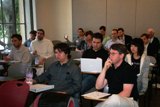 |
|
4:30-5:00pm
|
Break
|
|
5:00-6:20pm
|
Session 1, Lecture by Michael Augros:
The Classical Background to the
Controversy
Reading:
- Aristotle, Physics I.1;
- selections from Thales, Pythagoras, Democritus, Heraclitus, Empedocles, Anaxagoras, Leucippus;
- Aristotle, selections from Physics and Metaphysics
[PDF].
|
|
7:00pm
|
Dinner gathering for fellowship and discussion.
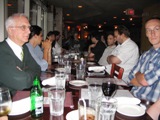 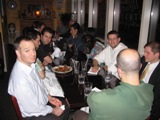
|
Tuesday
|
10:40-12:00n
|
Session 2, Lecture by James Navarro: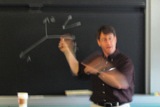
The Modern Background to the
Controversy
Reading:
- John Locke, "Of Ideas," Essay Concerning Human Understanding (1690), Bk II selections;
- Julien Offray de La Mettrie, “Man a Machine” (1748);
- Herbert Spencer, First Principles (1867),
§§93–97 [PDF];
- Immanuel Kant, "Methodology of the Teleological Power of Judgment," Critique of Judgement (1790), nn. 80-82
[PDF].
|
|
12:00n-2:00pm
|
Lunch break
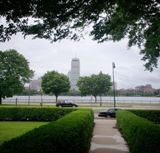
|
|
2:00-3:20pm
|
Session 3, Panel-led Discussion with Michael Augros and Lee Perlman:
Views of Nature, Ancient and Modern
Reading:
- Aristotle, Physics I, selections;
- Aristotle, Physics II.1;
- Aristotle, De Anima II.1;
- Rene Descartes, “The Principles of Human Knowledge,” Principles of Philosophy
I, nn. 8, 53-54, 63;
- Rene Descartes, “On the Principles of Material Things,” Principles of Philosophy
II, nn. 1, 4, 23 [PDF].
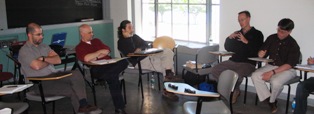 |
|
3:20-3:40pm
|
Break
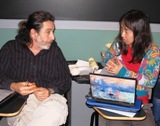
|
|
3:40-5:00pm
|
Session 4, Seminar led by Lee Perlman: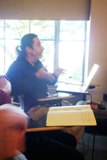
Early Thinking on Emergence
Reading:
- J.S. Mill, “Of the Composition of Causes,” ch. 6 of System of Logic
(1859) [PDF];
- G.H. Lewes, “Resultants and Emergents” from Problems of Life and Mind,
v. 2 (1875) [PDF].
|
|
5:00-7:30pm
|
Dinner break and unstructured discussions.
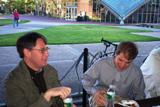 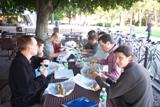
|
Wednesday
|
10:40-12:00n
|
Session 5, Lecture-Seminar introduced and led by James Barham: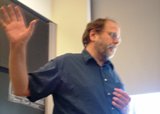
The British Emergentists
Reading:
- C.D. Broad, “Mechanism and its Alternatives,” from Mind & Its Place in Nature
(1925)
[PDF];
- (Optional) Samuel Alexander, “The Order of Qualities,”
Space, Time, and Deity, vol. 2 (1920) [PDF].
- (Optional) C. Lloyd Morgan, “Emergence,” from Emergent Evolution
(1921) [PDF];
|
|
12:00n-2:00pm
|
Lunch break
|
|
2:00-3:20pm
|
Session 6, Lecture-Seminar introduced and led by James Navarro: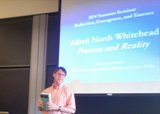
Early 20th-Century Concepts of Emergence
Reading:
- A.N. Whitehead, “Nature Alive” from Nature and Life (1934)
[PDF];
- L. Bertalanffy, selections from “An Outline of a General System Theory” (1950) [PDF].
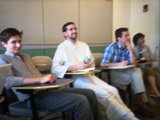 |
|
3:20-3:40pm
|
Break
|
|
3:40-5:00pm
|
Session 7, Lecture-Seminar introduced and led by James Barham:
Holism, Teleology, and Freedom
Reading:
- Henri Bergson, Creative Evolution (1921),
selections [PDF];
- Hans Jonas,
two "Didactic Letters to Lore Jonas, 1944," Memoirs
[PDF].
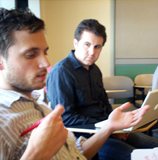 |
|
5:00-7:30pm
|
Dinner break and unstructured discussions.
|
Thursday
|
10:40-12:00n
|
Session 8, Lecture by James Barham: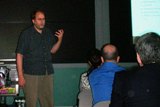
Contemporary Work on Emergence
Reading:
- Margaret Morrison, "Emergence, Reduction, and Theoretical
Principles: Rethinking Fundamentalism," Philosophy of Science,
73 (December 2006): 876–887 [PDF];
- Mary Jane West-Eberhard 2005 "Phenotypic Accommodation: Adaptive
Innovation Due to Developmental Plasticity," Journal of
Experimental Zoology [PDF].
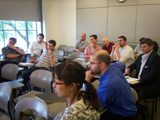 |
|
12:00n-2:00pm
|
Lunch break
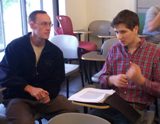
|
|
2:00-3:20pm
|
Session 9, Panel-led Discussion with Michael Augros, and James Barham, James Navarro, and Lee Perlman, moderated by John Keck:
Reductionism and Emergentism and the Classical View of Nature
Reading:
Review the texts from previous sessions
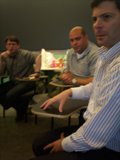
|
|
3:20-3:40pm
|
Break
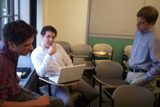 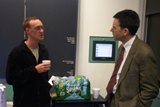
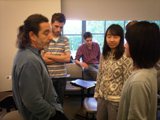
|
|
3:40-5:00pm
|
Session 10, Lecture by Bernhardt Trout:
A Critical Look at Empirical Emergence in Inanimate Nature
Reading:
-
Francis Bacon, The New Organon (1620), excerpts [PDF];
-
Laughlin, Pines, Schmalian, Stojkovic, and Wolynes 2000
“The Middle Way,” Proceedings of the National
Academy of Sciences
[PDF].
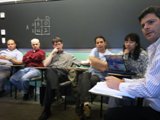 |
|
6:00-8:30pm
|
Seminar banquet at local restaurant.
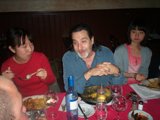 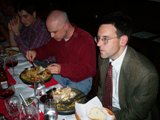
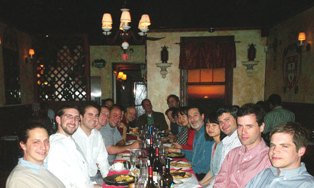
|
Friday
|
10:40-12:00n
|
Session 11, Lecture by Joe Audie:
A Scientist Evaluates Emergence in
Biology
Reading:
- Marc H.V.Van Regenmortel 2004, "Reductionism and
complexity in molecular biology," EMBO Reports 5:11,
1016-20 [PDF];
- Scott F. Gilbert and Sahorta Sarkar 2000 "Embracing
Complexity: Organicism for the 21st Century" Developmental
Dynamics 219:1–9 [PDF].
|
|
12:00n-2:00pm
|
Lunch break
|
|
2:00-3:20pm
|
Session 12, Conclusion by Staff:
Summary, Review, and Discussion
|
|
3:20-3:40pm
|
Break
|
|
3:40-4:30pm
|
Examination/evaluations
|
|
7:00-8:30pm
|
Dinner at local restaurant.
|
Notes on Session Format
Lecture – a formal presentation
followed by time for questions
Seminar – a round-table discussion
of the reading facilitated by the leader
Lecture-Seminar – a hybrid of
lecture and seminar. The leader speaks at the beginning to give
background to the reading (history, structure) and set up the
focus of discussion. This form is intended to constrain the
space of discussion a bit to allow us to have a productive
discussion in a short time.
Panel-led discussion – similar to a
talking-heads show with audience participation. Perhaps we
should describe it as a Socratic dialogue among the leaders, but
with the audience (viz., students) also taking part.
|

